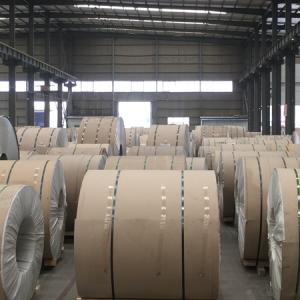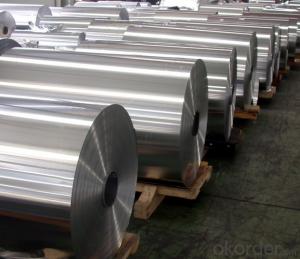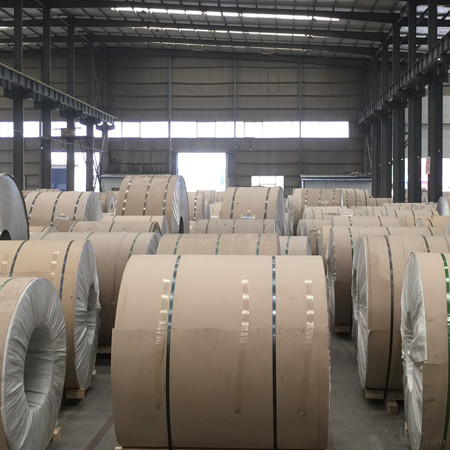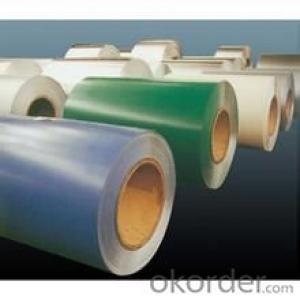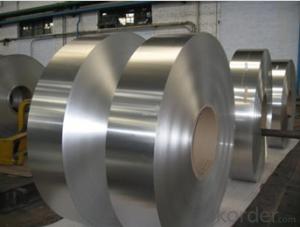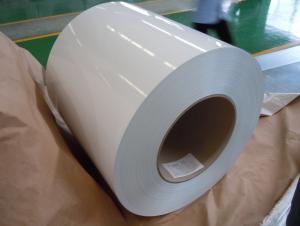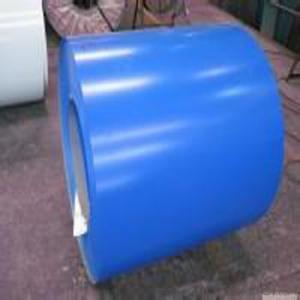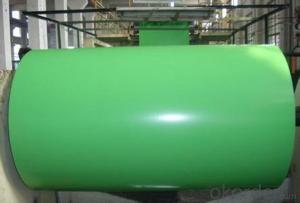Wholesale Painted Aluminum Coil for Automobile Components
- Loading Port:
- Shanghai
- Payment Terms:
- TT OR LC
- Min Order Qty:
- 5 m.t.
- Supply Capability:
- 60000 m.t./month
OKorder Service Pledge
OKorder Financial Service
You Might Also Like
Specification
Color Coated Aluminium Roll For Automobile Components
Specifications
1060, 1100, 3003, 8011, etc. | |
Temper | H16, H18, H24, H26, H28 |
Thickness | From 0.05mm to 3.0mm |
Width | Standard width:1240mm |
Special width:1300mm, 1520mm, 1570mm, 1595mm | |
Diameter | Standard dia:1200mm |
Interior dia:150mm,405mm,505mm | |
Weight | 2.5 T/coil,3.0 T/coil |
Coating | PE, PVDF, ACRYLIC |
Surface | Embossed, mill finish, coated |
Color | AS to code RAL |
Gloss | 10-90%(EN ISO-2813:1994) |
Coating Thickness | PE: more than 18 micron |
PVDF: more than 25 micron | |
Coating Hardness(pencil resistance) | More than 2h |
Coating adhesion | 5J (EN ISO-2409:1994) |
Impact Resistance | No peeling or cracking(50 kg/cm,ASTMD-2794:1993) |
Flexibility(T-bend) | 2T |
MEK resistance | More than 100 |
Advantage | 1.High temperature resistant 2.Weathering resistant 3.Scrubbing resistant 5.Acid or alkali proof 6. Fireproof 7.Light weight material is easy to construct and install |
Out package | Wooden splint with export standard |
Application | ACP, wall cladding, facades, roofs and canopies, ceilings, signboards, blind window, display platforms, electrical panels, etc |
Characteristics
1) Excellent weather-proof durability
2) Anti-ultraviolet
3) High erosion resistance
4) Stable color and gloss
5) Good mechanical processing performance
6) Abrasion resistance
7) Anti-impact
8) High flexibility
Application
1) Construction material further processing
2) Solar cell frame, solar battery frame
3) Glass curtain wall frame
4) Interior decoration
5) Elevator decoration
6) Signs, nameplate, bags making.
7) Automobile parts material
8) Office and Household appliances: HVAC equipments
9) The consumer electronics: mobile phones, digital cameras, MP3 .etc.
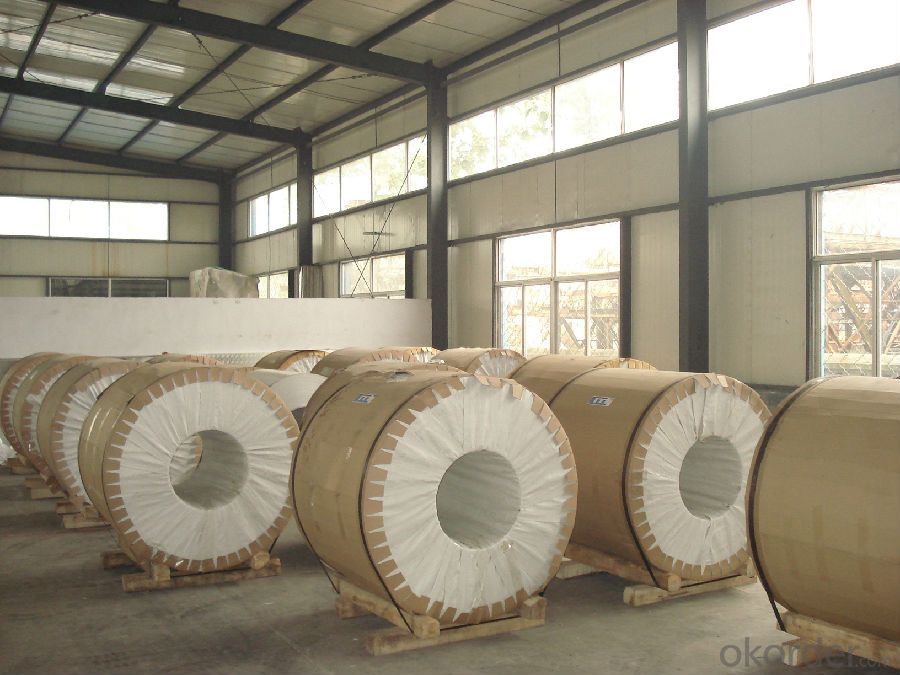
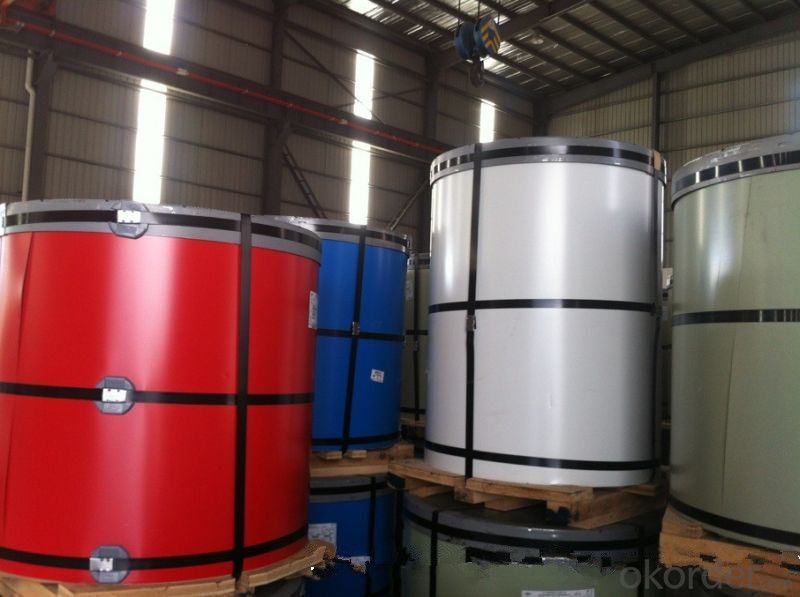
- Q: Just want to know for any boat builders out there. I have been told by my local paddling store that there are no aluminum kayaks. Why couldn't i build one? it cant be weight, I would build the frame from 1/2 inch square aluminum tubing and the body out of 1/32 high grade sheeting. So why does something like this not exist?
- Aluminum kayaks have been built. Few amateur builders know how to weld much less weld aluminum. Ideally you would need female molds and a press. Stretch forming can harden the aluminum and eliminate the need for a frame. If you make male molds, you could force form deck and hull parts and then join them. Read about amateur airplane builders. The big concern with an aluminum kayak is its tendency to stick to river rocks. Every whitewater run has devoured scores of aluminum canoes. Steel is possible.
- Q: For an intake manifold on a car, as far as increasing the inlet air temperature which is better steel or aluminum? Assuming the cylinder heads are aluminum, and half the thickness of steel is used versus aluminum. I know that steel has a lower heat capacity than aluminum, so does this mean even in this case the steel will heat up quicker and disperse the heat into the inlet air more than aluminum? Basically which material will keep the inlet air as low as possible. I know certain plastics are better than both, but I'm just curious about these two metals. Thank you.
- Increasing heat temperature (Highest point) must be less than melting point of the Aluminum (1221 degree Fahrenheit).Now factor of the weight and stabilizing is important to choose the metal in that section .Aluminum is like fire cricket during melting and if be in flounce of the over heating my cause lot of damages .
- Q: This question is asking about the potential negative effects or hazards associated with the use of aluminum coils.
- <p>The use of aluminum coils can pose certain risks and dangers, primarily due to their high thermal conductivity and reactivity. When used in cooking or heating applications, aluminum coils can cause uneven heat distribution, which may lead to burning or melting of food. Additionally, aluminum can react with acidic or alkaline foods, potentially leaching aluminum into the food and causing health concerns such as neurological disorders and bone diseases. Moreover, aluminum coils can corrode over time, especially when exposed to moisture or certain chemicals, which can weaken their structure and pose a risk of breakage or injury. It's important to use aluminum coils appropriately and to monitor their condition regularly to minimize these risks.</p>
- Q: What are the different types of aluminum alloy used in coil production?
- There are several different types of aluminum alloys used in coil production, including 1xxx, 3xxx, and 5xxx series alloys. These alloys offer varying levels of strength, corrosion resistance, formability, and other properties, making them suitable for different applications in the manufacturing industry.
- Q: How to use aluminum sheet to roll a 12m-long aluminum coil with a diameter of 184cm?
- According to project experience, first you should check the specification of the aluminum sheet and then design crafts such as connection method, installation and transportation according to equipment.
- Q: Is it possible to utilize aluminum coils for crafting artistic installations or distinctive creations?
- <p>Yes, aluminum coils can be used to create art installations and other unique creations. Their malleability, durability, and lightweight nature make them ideal for sculptural works. Artists can bend, shape, and weld aluminum coils into various forms, offering a wide range of design possibilities. The material's reflective surface can also add visual interest, especially when used in installations that interact with light and shadow. Additionally, aluminum's resistance to corrosion makes it suitable for outdoor art pieces, ensuring longevity and low maintenance.</p>
- Q: Are there any specific certifications or qualifications required for aluminum coil suppliers?
- Yes, there are specific certifications and qualifications that are important for aluminum coil suppliers. One of the key certifications for aluminum coil suppliers is the ISO 9001 certification, which ensures that the supplier has implemented a quality management system and meets the international standards for quality. This certification indicates that the supplier has effective quality control processes, consistent product performance, and customer satisfaction. Another important qualification for aluminum coil suppliers is the AS9100 certification, specifically for suppliers serving aerospace industries. This certification ensures that the supplier has met the quality management system requirements specific to the aerospace industry, including stringent quality control, traceability, and compliance with industry standards. Additionally, aluminum coil suppliers may also need to comply with specific industry standards such as the American Society for Testing and Materials (ASTM) standards or the European Union's REACH regulations for chemical substances. These standards ensure that the supplier's products meet the required specifications and are safe for use in various applications. Furthermore, some aluminum coil suppliers may possess specialized certifications or qualifications related to specific industries or applications. For example, suppliers serving the automotive industry may hold certifications such as the International Automotive Task Force (IATF) 16949 certification, which demonstrates their ability to meet the demanding requirements of automotive manufacturers. Overall, while specific certifications and qualifications may vary depending on the industry and application, aluminum coil suppliers should have certifications such as ISO 9001 and industry-specific certifications to ensure their products meet the required quality standards and comply with relevant regulations.
- Q: What is the impact of alloy purity on the performance of aluminum coils?
- The impact of alloy purity on the performance of aluminum coils is significant. Higher alloy purity leads to improved conductivity, strength, and corrosion resistance of the coils. It also enhances the overall efficiency and longevity of the coils. Conversely, lower alloy purity may result in reduced performance, lower conductivity, and increased susceptibility to corrosion. Therefore, ensuring high alloy purity is crucial for maximizing the performance and durability of aluminum coils.
- Q: How are aluminum coils processed for surface preparation?
- To ensure proper adhesion of coatings, improve corrosion resistance, and enhance overall appearance, various surface preparation processes are carried out on aluminum coils. These processes typically include cleaning, degreasing, and etching. To begin with, the coils undergo a cleaning process to eliminate any dirt, dust, or contaminants. This can be achieved through either mechanical or chemical methods. Mechanical cleaning involves the use of brushes, scrubbers, or high-pressure water spray to physically remove impurities from the surface. On the other hand, chemical cleaning involves the application of mild alkaline or acidic cleaning agents that dissolve and eliminate contaminants. Following the cleaning process, the coils are degreased to eliminate any remaining oils or greases. This can be done using solvents or an alkaline degreasing process. Solvent-based degreasers are applied to the coil surface, allowing them to dissolve and remove any oil or grease residues. Alternatively, alkaline degreasing involves immersing the coils in an alkaline solution that reacts with the grease, resulting in the formation of soap that can be easily rinsed off. Once the coils have been cleaned and degreased, they may undergo an etching process to enhance surface roughness and promote better adhesion of subsequent coatings. Etching can be carried out using chemical or electrolytic methods. Chemical etching involves immersing the coils in an acidic solution that removes a thin layer of aluminum oxide from the surface, creating a roughened surface. On the other hand, electrolytic etching utilizes an electrical current to remove the oxide layer. After the surface preparation steps, the aluminum coils are typically rinsed with water to remove any residual cleaning or etching chemicals. Subsequently, the coils are dried to ensure a clean and dry surface, ready for the application of coatings or further processing. In conclusion, the surface preparation of aluminum coils involves a combination of cleaning, degreasing, and etching processes to achieve a clean, smooth, and properly prepared surface for subsequent treatments.
- Q: Are there any limitations on the welding or soldering of aluminum coils?
- Yes, there are limitations on welding or soldering aluminum coils. Aluminum has a relatively low melting point and high thermal conductivity, which can make it challenging to weld or solder effectively. The oxide layer on the surface of aluminum also makes it difficult to achieve a strong bond. Additionally, aluminum is prone to distortion and warping during the welding or soldering process. Therefore, special techniques and equipment, such as using specialized fluxes, inert gases, and proper pre-cleaning, are required to overcome these limitations and achieve successful welds or solder joints on aluminum coils.
Send your message to us
Wholesale Painted Aluminum Coil for Automobile Components
- Loading Port:
- Shanghai
- Payment Terms:
- TT OR LC
- Min Order Qty:
- 5 m.t.
- Supply Capability:
- 60000 m.t./month
OKorder Service Pledge
OKorder Financial Service
Similar products
Hot products
Hot Searches
Related keywords
